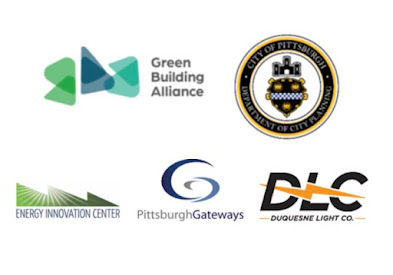While working to establish a neighborhood-scale clean energy plan, this project will also explore opportunities to retrofit older homes in the Hill District to make them more energy efficient.
The technical opportunity grant is presented via the Communities Local Energy Action Program (LEAP) pilot, offered jointly by DOE’s Offices of Energy Efficiency and Renewable Energy, Electricity, Policy, Fossil Energy and Carbon Management, Indian Energy, and Economic Impact and Diversity.
This pilot initiative complements DOE’s ongoing efforts to deliver the benefits from clean energy research, development, demonstration, and deployment to environmental justice communities and communities with historical ties to fossil fuel industries.
The Hill District’s sloping topography and history present environmental constraints to commercial and residential development of these parcels, which are located over abandoned coal mines, with a coal seam running below.
Technical expertise provided by the National Renewable Energy Laboratory will enable the evaluation of the approximately 600 acres of undermined land as potential future locations for solar, thermal, or small-scale wind energy generation.
If the land is found to be viable, clean energy generated at these locations would be designated to serve Hill District residents, lowering heating and cooling utility costs for those living in the neighborhood.
The associated energy cost savings would be designated to benefit residents of the Hill District.
“This technical assistance comes at a great time for the neighborhood: The Hill District is finalizing its neighborhood plan to shape its next 10 years,” says Flore Marion, City of Pittsburgh Sustainability and Resilience Planner. “This assistance will result in a roadmap that create synergies between local new ideas and existing programs and align them with funding sources to create healthier homes and rely on cleaner energy.”
The Green Building Alliance and its partners are also interested in exploring the possibility of directing revenue generated through excess clean energy production to a community fund managed by a community organization.
The funds could then be designated to support neighborhood initiatives such as land maintenance, tree plantings, or other amenities and improvements.
“In Pittsburgh, 61 percent of the housing stock is over 100 years old,” says Executive Director Jenna Cramer. “The majority of these homes are energy inefficient, with high maintenance costs due to aging systems and higher year-round energy bills. This creates a disproportionate financial burden to Hill residents, 40% of which are living under the poverty line. By assessing opportunities to retrofit older homes and generating clean, renewable energy on site, we would be able to pass on savings to those living in the Hill District, while also contributing to a healthier community for all.”
Pittsburgh Gateways, a non-profit in the Hill District and the developer and owner of the Energy Innovation Center, looks forward to continuing the important work on a clean energy plan for the historic Hill District.
“Addressing the energy burden of residents and the larger issues of electrification and resilience is directly in line with our mission,” said Don Evans, CEO of Pittsburgh Gateways. “Collaboration on these topics, with a people/place/planet/performance approach will be crucial to long term sustainability."
“The Hill District Clean Energy Strategy strongly aligns with Duquesne Light Company’s mission to create a clean energy future for the customers and communities we serve,” said Elizabeth Cook, general manager of advanced grid solutions at Duquesne Light Company. “We’re grateful for the opportunity to continue supporting our partners in this important effort while championing projects that promote electrification, reduce greenhouse gas emissions and improve energy burden, especially for vulnerable and underserved communities.”
To learn more about green innovation in the Pittsburgh Region, visit the Pittsburgh Green Story website.
NewsClip:
-- WESA: Pittsburgh Hill District Gets Federal Money To Develop Renewable Energy Plan Focused On Vacant Lots
Related Article:
-- Spotlight - Mine Water Powers Energy-Saving Geothermal System For Pittsburgh Church [This church has since closed, but the system is still there and could be expanded into the Hill District neighborhood.]
[Posted: April 5, 2022] PA Environment Digest


No comments :
Post a Comment